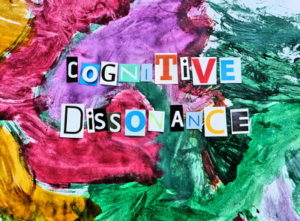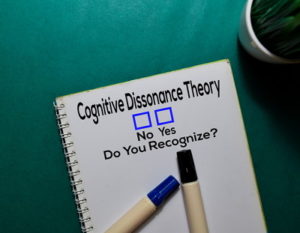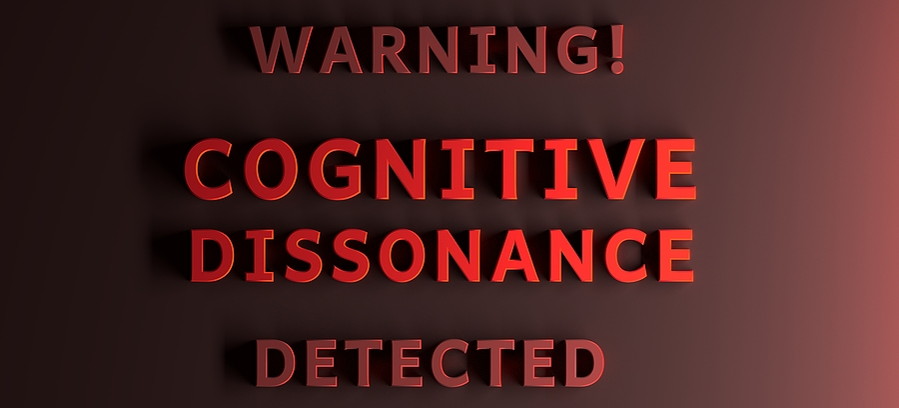 The notion of cognitive dissonance is one that has become more apparent in recent times. The likes of Brexit and general elections in the United Kingdom have seen people act in ways that are actually contrary to their own beliefs, separating themselves from what they do. A person struggling to put food on the table and yet still voting for the Conservative and Unionist Party would be a good example of this. Equally, people that voted for Britain to leave the European Union got over their cognitive dissonance by becoming entrenched in their beliefs and refusing to listen to reason or sense.
The notion of cognitive dissonance is one that has become more apparent in recent times. The likes of Brexit and general elections in the United Kingdom have seen people act in ways that are actually contrary to their own beliefs, separating themselves from what they do. A person struggling to put food on the table and yet still voting for the Conservative and Unionist Party would be a good example of this. Equally, people that voted for Britain to leave the European Union got over their cognitive dissonance by becoming entrenched in their beliefs and refusing to listen to reason or sense.
In the world of betting, cognitive dissonance occurs when people separate how they feel they have behaved from how they have actually behaved. A bettor will often believe that they have spent a certain amount of money on their gambling, which actually proves to be much more than that in the cold light of day. The cognitive dissonance in place, however, means that most gamblers are able to compartmentalise how much money they have lost and ignore it as though it isn’t real. Offering personalised feedback can interrupt this mentality and have a positive effect on problem gamblers.
In fact, many casino games especially are deigned to deceive and actually encourage cognitive dissonance. For example, making a return seem like a win when in fact you may have won less than your stake back. It deceives us into thinking we are winning more than we are or losing less than we think.
Gambling When Against Gambling
 According to the dictionary, the definition of cognitive dissonance is ‘the state of having inconsistent thoughts, beliefs, or attitudes, especially as relating to behavioural decisions and attitude change.’ This was flagged up in a study into Chinese attitudes towards gambling, with many gamblers taking part in the exercise of gambling whilst also holding negative attitudes towards it as a pastime. In China, traditional cultural values suggest that gambling is a bad thing, so it was that 200 adult Chinese respondents were asked to fill in questionnaires about their thoughts and feelings on the topic.
According to the dictionary, the definition of cognitive dissonance is ‘the state of having inconsistent thoughts, beliefs, or attitudes, especially as relating to behavioural decisions and attitude change.’ This was flagged up in a study into Chinese attitudes towards gambling, with many gamblers taking part in the exercise of gambling whilst also holding negative attitudes towards it as a pastime. In China, traditional cultural values suggest that gambling is a bad thing, so it was that 200 adult Chinese respondents were asked to fill in questionnaires about their thoughts and feelings on the topic.
It has long been considered in Chinese society that gambling is improper and immoral. Both Buddhism and Confucius, two important characters in China, were seemingly against gambling. In 2009, Cheng discovered a carving from the Qing Dynasty that specifically warned people against gambling, suggesting that it would lead to the ‘forfeiture of moral decency’. As a result, the research tried to bear in mind the fact that many people in or from China would have ingrained negative beliefs about the activity of gambling, yet still chose to gamble in their spare time and spend money on betting from time to time.
There is a necessity to engage cognitive dissonance for people that live in a world where gambling is frowned upon or there is an outright hostility towards it and yet they still choose to gamble. For many Chinese people, excessive gambling has been a precursor of either suicide or attempted suicide, precisely because of the cognitive dissonance in place. When you consider that Chinese people tend to gamble more than other populations and therefore a higher rate of gambling addiction, it is easy to see why it is that the concern of cognitive dissonance amongst Chinese gamblers is so high.
Removing Cognitive Dissonance
 Cognitive dissonance is a major issue for gamblers. Those that suffer from it will often be unaware of how much they gamble and how often they tend to engage in gambling as an activity. It goes without saying that problem gambling tends to lead to financial difficulties as well as legal problems and issues within relationships. With this in mind, it is common for either the bettors themselves or else people related to them to want to end problem gambling. For those that suffer from cognitive dissonance, this becomes about removing that particular issue where possible.
Cognitive dissonance is a major issue for gamblers. Those that suffer from it will often be unaware of how much they gamble and how often they tend to engage in gambling as an activity. It goes without saying that problem gambling tends to lead to financial difficulties as well as legal problems and issues within relationships. With this in mind, it is common for either the bettors themselves or else people related to them to want to end problem gambling. For those that suffer from cognitive dissonance, this becomes about removing that particular issue where possible.
One of the most important things that those that gamble can do is self-reflect. This is where cognitive dissonance becomes an issue, because those that suffer from it refuse to admit the problems that they’ve got. In order to try to get gamblers to be more responsible, personalised feedback can be crucial. Research has found that giving gamblers personalised feedback tends to help them spend less money and less time on gambling when compared to people that didn’t receive any form of personalised feedback. This feedback can come in the form of presenting the gambler in question with facts.
Presenting a gambler with the truth about how much they bet or how often they gamble can lead to self-reflection. Presented with the reality of their cognitive dissonance can lead people to choose to reduce how often they bet or how much money they spend on it as an activity. If you’re worried about how much or how regularly you gamble, it is worth getting a piece of paper and writing down how often you think you gamble and how much you think it is that you lose. Then login to your account and see how much it is that you have actually been betting and spending.

Seeing these figures side-by-side will help to remove the barrier of cognitive dissonance as it becomes impossible to argue with facts written in black and white. Realising that you either spend more time or more money betting than you thought will theoretically allow you to put things in place to stop that from happening. Obviously stopping gambling altogether would be the best way forward, but even merely being able to reign in your betting would be a huge step forward. At the very least, it will allow you to honestly confront your gambling habits.
It is also important to know the ways in which your own cognitive dissonance works. It isn’t just about how much you bet or how often you place bets. It can be about what you bet on, whether that be specific sports or betting on the casino rather than the sportsbook. Believing that you only ever bet on one thing when you actually bet on numerous different sports as well as using the casino, bingo and so on can be a problem. It can also help to write a list about what it is that you think you bet on and compare that to your actual betting history.
